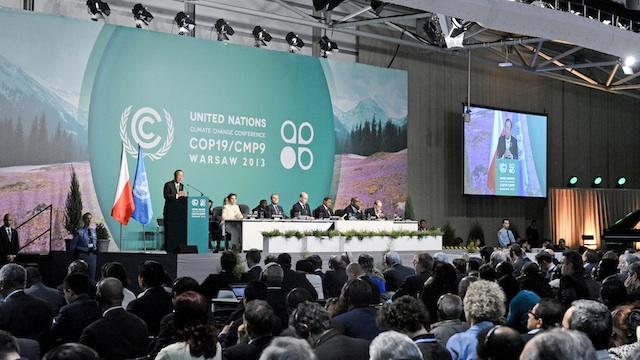SUMMARY
This is AI generated summarization, which may have errors. For context, always refer to the full article.

WARSAW, Poland – Rich and poor countries butted heads at UN climate talks in Warsaw with time running out on Friday, November 22, to devise a plan to keep the troubled process on track.
Negotiators had worked late into the night, seeking consensus on how to forge an ambitious, global pact on climate change by 2015.
Yet nations remained deeply divided, said delegates.
They squabbled over how to share the burden of carbon emissions curbs to limit global warming to 2.0 degrees Celsius (3.6 Fahrenheit), and how to channel aid to poor countries.
“It is indeed one sleepless night in front of us but we are still hoping to close the meeting as soon as possible,” said Polish Deputy Environment Minister Beata Jaczewska, whose country hosts the 11-day parley.
“I cannot give too many of the details but we are on a very good track,” she insisted.
Gathering more than 190 nations, the annual negotiations are meant to pave the way to deal to be signed in Paris by December 2015 to tame climate-altering greenhouse gases emitted by burning coal, oil and gas.
The Climate Action Network, an umbrella body of green groups, said ministers still “have a lot to do” in Warsaw.
“Some emerging economies (are) blocking a way forward on a fair way to divide climate action, and still other delegations (are) fighting a solid agreement on when and where pledges” for emissions cuts should be made, it said.
Rows over carbon cuts and money
On current emissions trends, scientists warn the Earth could face warming of 4.0 C or higher over pre-industrial levels — a recipe for catastrophic storms, droughts, floods and land-gobbling sea-level rise.
Developing countries want their wealthier counterparts to shoulder a bigger share of emissions cuts to account for a long history of fossil-fuel combustion.
The West, though, insists that emerging economies, voraciously burning coal to fuel their development, have to do their fair share.
China is now the world’s biggest emitter of CO2, with India in fourth place after the United States and Europe.
Developing countries have accused rich nations of backtracking on their commitments.
They point to Japan for slashing its carbon goal, and Australia’s decision to scrap a carbon tax on high emitters.
Poorer countries also suspect the West of trying to weasel out of a 2009 promise to muster $100 billion (74 billion euros) in aid to climate-vulnerable nations by 2020.
Still struggling with an economic crisis, the developed world is wary of unveiling a detailed plan at this stage.
By Friday lunchtime, with only hours of scheduled negotiations to go, there was no detailed plan for arriving at the 2015 deal.
A draft text went so far as to “invite” parties to announce emissions curbing targets “well in advance” of the Paris meeting.
Delegates disagreed even on whether the targets should be called “commitments” or “contributions”, and on how to ensure they would be adequate to meet the 2 C target.
The money crunch lies at the heart of another issue bedevilling the talks: demands by developing countries for a mechanism to help them deal with future losses from climate impacts they say are too late to avoid.
Rich nations fear this would amount to signing a blank cheque for never-ending liability.
The conference is scheduled to close by 1700 GMT on Friday, but many were bracing themselves for another late night’s work.
On Thursday, environment and developmental observer groups walked out, saying the talks had produced little more than hot air since November 11, and were “on track to deliver virtually nothing”. – Rappler.com
Add a comment
How does this make you feel?
There are no comments yet. Add your comment to start the conversation.